Mark Fuhrman: Life After the O.J. Trial
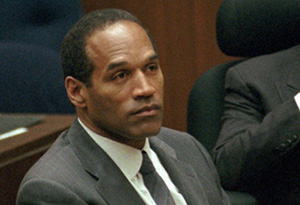
Photo: AP
Who could forget the white Bronco on the freeway, the superstar athlete-turned-actor, the bloody glove, Kato Kaelin, the "race card," the all-star defense team... and the stunning not-guilty verdict?
O.J. Simpson's iconic 1995 trial and acquittal on charges of murdering his ex-wife, Nicole Brown Simpson, and her friend Ron Goldman, was one of the most unforgettable stories of the decade.
One of the key players in this real-life soap opera was Los Angeles Police Department detective Mark Fuhrman. Under oath, Mark denied ever having used the N-word, but tapes revealed that he was lying. The defense seized on this lie as part of their strategy to create enough doubt in minds of jurors about the evidence to lead to a not guilty verdict.
O.J. Simpson's iconic 1995 trial and acquittal on charges of murdering his ex-wife, Nicole Brown Simpson, and her friend Ron Goldman, was one of the most unforgettable stories of the decade.
One of the key players in this real-life soap opera was Los Angeles Police Department detective Mark Fuhrman. Under oath, Mark denied ever having used the N-word, but tapes revealed that he was lying. The defense seized on this lie as part of their strategy to create enough doubt in minds of jurors about the evidence to lead to a not guilty verdict.
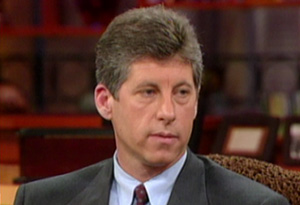
Appearing on The Oprah Winfrey Show in 1997, Mark said he wished he had just admitted that he had used the N-word before. "I owe everyone an apology, including you," he said to Oprah.
Though he said he is not a racist, Mark said being caught in a lie allowed the defense to turn the trial's focus from crime to racism. "This was a murder case, a tragic murder case. Race had no place in this," he said then. "I feel responsible for giving the defense exactly what they were looking for. They had nothing to fight the case. They had to turn to something."
At the time, Mark said he had no regrets about his work. "I did good detective work in this case. I brought forward a lot of evidence, and so did my partner, Brad Roberts," he said. "If that would have just been used, history would have been a little different."
Though he said he is not a racist, Mark said being caught in a lie allowed the defense to turn the trial's focus from crime to racism. "This was a murder case, a tragic murder case. Race had no place in this," he said then. "I feel responsible for giving the defense exactly what they were looking for. They had nothing to fight the case. They had to turn to something."
At the time, Mark said he had no regrets about his work. "I did good detective work in this case. I brought forward a lot of evidence, and so did my partner, Brad Roberts," he said. "If that would have just been used, history would have been a little different."
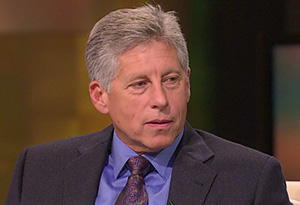
Instead of race, Mark says the trial should have focused on the mountains of evidence he and his partner, Brad Roberts, had uncovered. That wasn't possible, Mark says, because the detective assigned by the department to be in charge of the case, Phil Vannatter, "effectively testified" that he had found the evidence, even though Mark and Brad actually had. Therefore, Mark says, Brad could not be called to the stand. "You can't have Brad finding the same things [as Vannatter]," Mark says.
Though Mark says Brad personally showed prosecutor Marcia Clark where some evidence was found at O.J.'s Rockingham estate, he was left out of the case. "Nobody interviewed Brad Roberts—nobody from robbery homicide, nobody from the prosecutor's office," Mark says. "He was never talked to after that first day."
Watch Mark speculate on what would happen if he got to face O.J.
Though Mark says Brad personally showed prosecutor Marcia Clark where some evidence was found at O.J.'s Rockingham estate, he was left out of the case. "Nobody interviewed Brad Roberts—nobody from robbery homicide, nobody from the prosecutor's office," Mark says. "He was never talked to after that first day."
Watch Mark speculate on what would happen if he got to face O.J.
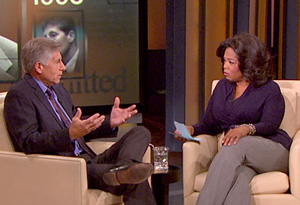
Mark says investigators ignored two pieces of evidence that he believes could have changed the outcome of the trial. One was a piece of gum with molar impressions that, Mark says, could have acted like a fingerprint. "You write a search warrant, you get a dentist to go into the jail, you get a mouth impression," he says. "You compare it using a forensic dentist. He says, 'It is one and the same.'"
The other potentially explosive piece of evidence actually was a fingerprint. "When [the murderer] leaves, there is a gate and there is a brass turnstile on that gate," he says. "There is a thumbprint right on the brass turnstile, in blood. As he went through, he pushed it open."
Mark says his partner found this bloody thumbprint, and he wrote it up very clearly in his notes. "So all these piece of evidence I'm noting, and then when I relinquish it, nobody read my notes for two months," he says. Like the gum, the bloody thumbprint was never used in the criminal trial. In the later civil trial, Mark says, the Brown family used testimony from the locksmith who threw away blood-smeared gate lock to help win a $33.5 million judgment against O.J.
The other potentially explosive piece of evidence actually was a fingerprint. "When [the murderer] leaves, there is a gate and there is a brass turnstile on that gate," he says. "There is a thumbprint right on the brass turnstile, in blood. As he went through, he pushed it open."
Mark says his partner found this bloody thumbprint, and he wrote it up very clearly in his notes. "So all these piece of evidence I'm noting, and then when I relinquish it, nobody read my notes for two months," he says. Like the gum, the bloody thumbprint was never used in the criminal trial. In the later civil trial, Mark says, the Brown family used testimony from the locksmith who threw away blood-smeared gate lock to help win a $33.5 million judgment against O.J.
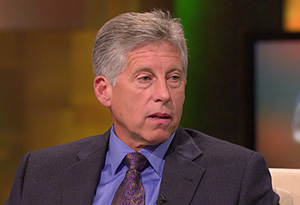
It's been 15 years since the unforgettable not-guilty verdict rocked the courtroom, but the overlooked evidence and countless mistakes that Mark says plagued the entire O.J. Simpson trial still leave him frustrated with the key players in the court. Oprah asks Mark what he would say now to them.
Philip Vannatter, lead detective on the case
"He was a clown in a detective suit. Everything he touched turned to lead."
Prosecuting attorney Marcia Clark
"She knew. She knew all about Vannatter, she knew all about Roberts. She knew that Vannatter didn't find that evidence. She covered it up because she didn't want Roberts on the stand."
Prosecuting attorney Chris Darden
"Stop being angry. You participated in the failure. You did nothing creative. You did nothing to stop this."
Mark says he believes he should have gone public 16 years ago with what he says he knew about the investigation. "Roberts and I could have stopped the trial in August of 1994, and we should have," he says. "When we saw that [Vannatter] was taking Roberts' observations and discoveries and making them his own, we should have stopped it right there."
When contacted by The Oprah Show, retired LAPD detective Phil Vannatter declined to comment on Mark Fuhrman's allegations, except to say it has been 15 years and he has moved on.
In her statement, Marcia Clark says: "I find with Mark Fuhrman, there has been a lot of rewriting history about the case. Phil Vannatter was put on the stand because he was the detective listed in police reports who had recovered the evidence. He certainly did not cause the case to be lost."
Philip Vannatter, lead detective on the case
"He was a clown in a detective suit. Everything he touched turned to lead."
Prosecuting attorney Marcia Clark
"She knew. She knew all about Vannatter, she knew all about Roberts. She knew that Vannatter didn't find that evidence. She covered it up because she didn't want Roberts on the stand."
Prosecuting attorney Chris Darden
"Stop being angry. You participated in the failure. You did nothing creative. You did nothing to stop this."
Mark says he believes he should have gone public 16 years ago with what he says he knew about the investigation. "Roberts and I could have stopped the trial in August of 1994, and we should have," he says. "When we saw that [Vannatter] was taking Roberts' observations and discoveries and making them his own, we should have stopped it right there."
When contacted by The Oprah Show, retired LAPD detective Phil Vannatter declined to comment on Mark Fuhrman's allegations, except to say it has been 15 years and he has moved on.
In her statement, Marcia Clark says: "I find with Mark Fuhrman, there has been a lot of rewriting history about the case. Phil Vannatter was put on the stand because he was the detective listed in police reports who had recovered the evidence. He certainly did not cause the case to be lost."
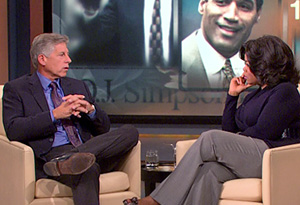
After the trial, Mark's life changed dramatically. Because he lied under oath, he was convicted of perjury and lost his job as a police officer.
Even if he had told the truth on the stand and O.J. had been convicted, Mark says he could never have gone back to his anonymous life as a hardworking detective. "I don't like the recognition. I'd rather be behind the scenes with something that interests me. That changed completely," he says. "I'd try to go out into the field to work on other murder cases, and the suspects wanted to talk about Simpson case. I mean, that's pretty debilitating when you can't be taken seriously in that regard."
Even if he had told the truth on the stand and O.J. had been convicted, Mark says he could never have gone back to his anonymous life as a hardworking detective. "I don't like the recognition. I'd rather be behind the scenes with something that interests me. That changed completely," he says. "I'd try to go out into the field to work on other murder cases, and the suspects wanted to talk about Simpson case. I mean, that's pretty debilitating when you can't be taken seriously in that regard."
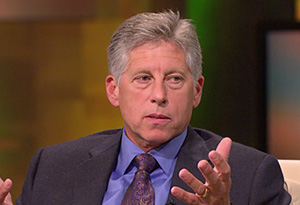
The media circus surrounding the O.J. trial was our first taste of the future of television, Mark says. "There was this unintentional converging of technology, reality TV, bored people, all these crime shows on TV," he says. "And they realize, man, they're going to make a lot of money and they don't have to pay for actors."
Since the 1995 O.J. trial, Mark says, murders—whether they're fictionalized drama or real-life human interest stories—have become entertainment. He explores how investigative journalism has given way to sensationalism and financial profit in his book The Murder Business.
Mark shares his opinions of the people who supported O.J. in 1995.
Since the 1995 O.J. trial, Mark says, murders—whether they're fictionalized drama or real-life human interest stories—have become entertainment. He explores how investigative journalism has given way to sensationalism and financial profit in his book The Murder Business.
Mark shares his opinions of the people who supported O.J. in 1995.
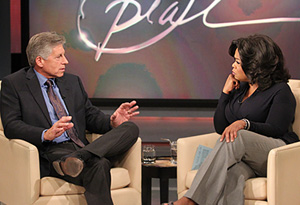
Photo: George Burns/Harpo Studios
Despite his strong opinions against the media, Mark now analyzes crimes for the FOX News Channel, going out into the field and working with detectives, almost as he used to. "I'm not a carnival sideshow act," he says. "This is about [being] a detective."
It's a role he'd been waiting for since the trial ended. "Before that, I was just trying to put my life together," Mark says. "I was working as an electrical apprentice with a friend of mine. I was living in Idaho, where I'd planned on moving long before the trial."
It's a role he'd been waiting for since the trial ended. "Before that, I was just trying to put my life together," Mark says. "I was working as an electrical apprentice with a friend of mine. I was living in Idaho, where I'd planned on moving long before the trial."
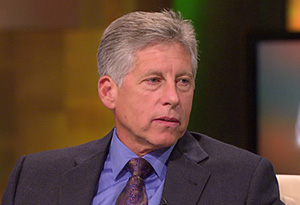
Even though Mark is no longer a detective, he still uses his police skills to investigate high-profile cases, like the 1975 murder case of Martha Moxley.
Thirty-five years ago, 15-year-old Martha was bludgeoned to death in her upper-class neighborhood of Greenwich, Connecticut. While the police investigated, they made no arrests—until new evidence was uncovered 27 years later.
This new evidence included information Mark found and lead to the arrest of Ethel Kennedy's nephew, Michael Skakel. "If you're not courageous enough to go up against some of the richest families in the country, then it's not going to be solved," Mark says. Through solid police work—conducting interviews, taping conversations, uncovering lies—Mark says he helped put together a puzzle just as he had done in the O.J. Simpson case years earlier.
Except this time, Mark's work paid off. Michael Skakel was convicted of Martha Moxley's murder and sentenced to 20 years to life in prison. Though he believes that this trial and the O.J. Simpson trial are mutually exclusive, Mark says the Skakel conviction was gratifying, especially in the wake of O.J.'s acquittal.
"I think I did pay a debt [to society]," he says.
Thirty-five years ago, 15-year-old Martha was bludgeoned to death in her upper-class neighborhood of Greenwich, Connecticut. While the police investigated, they made no arrests—until new evidence was uncovered 27 years later.
This new evidence included information Mark found and lead to the arrest of Ethel Kennedy's nephew, Michael Skakel. "If you're not courageous enough to go up against some of the richest families in the country, then it's not going to be solved," Mark says. Through solid police work—conducting interviews, taping conversations, uncovering lies—Mark says he helped put together a puzzle just as he had done in the O.J. Simpson case years earlier.
Except this time, Mark's work paid off. Michael Skakel was convicted of Martha Moxley's murder and sentenced to 20 years to life in prison. Though he believes that this trial and the O.J. Simpson trial are mutually exclusive, Mark says the Skakel conviction was gratifying, especially in the wake of O.J.'s acquittal.
"I think I did pay a debt [to society]," he says.
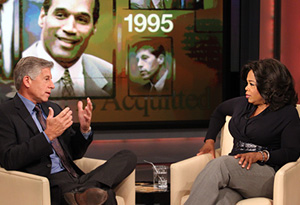
Photo: George Burns/Harpo Studios
With his detective days behind him, Mark says he misses the "blue-collar life" and having a rough-and-tumble job with people who both inspire and respect him. It's was an anonymous career he hasn't been able to enjoy in some time, he says. "Sixteen years," Mark says. "That's almost the amount of time I spent on the department. I'm not broken down. I can still solve a couple of things. So, all this time, I've wasted."
Instead of being remembered for good detective work, Mark believes his legacy will be focused on his disparaging role in the most memorable trial of his lifetime. "'The disgraced detective from the O.J. Simpson case died today,'" Mark quotes. "That will be the lead sentence [in my obituary]."
"And what would you want your legacy to be?" Oprah asks.
"Nothing," Mark says. "Nothing."
Watch Mark reveal his biggest regret about his involvement in this case.
Instead of being remembered for good detective work, Mark believes his legacy will be focused on his disparaging role in the most memorable trial of his lifetime. "'The disgraced detective from the O.J. Simpson case died today,'" Mark quotes. "That will be the lead sentence [in my obituary]."
"And what would you want your legacy to be?" Oprah asks.
"Nothing," Mark says. "Nothing."
Watch Mark reveal his biggest regret about his involvement in this case.



